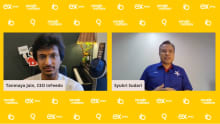Emerging workplace models and their significance in the future of work
Amid the pandemic, businesses everywhere shuttered their offices, without knowing exactly when they would be opening their doors again. This led to hurriedly put-together policies into play and we witnessed a workplace evolution like never before.
The democratisation of the workforce allowed people to decide how to work and when to work. Hence, three distinct workplace models emerged - fully remote, fully in-person and a hybrid model. At People Matters TechHR India’s Think Tank session, business leaders Vishpala Reddy, CHRO for the Indian Subcontinent of Philips India, Pramath Nath, CHRO of Steam Power at GE Power and Maninder Kapoor Puri, Global Chief People and Diversity Officer of Mastek Ltd, came together to brainstorm how to experiment to make the most out of these work models.
The hybrid work model is the new normal in workplaces
In the post-pandemic times, the hybrid work model is gaining the most traction. Vishpala Reddy, who is the CHRO for the Indian Subcontinent of Philips India, emphasised that HR leaders need to adapt in order to change the way they manage human capital. The transition will assist in maintaining productivity and an optimal level of interpersonal communication.
A shift in needs and demands of employees
According to Pramath Nath, CHRO of Steam Power at GE Power, “Human resources’ job is not limited to keeping people happy, but to make people love their job and keep them productive. Recruiting and training the best employees takes significant time and money investments. Without offering these workers a good employee experience, companies risk losing their investments when these employees forsake them for greener pastures.”
Reimagine HR practices
To keep businesses from getting affected negatively, improve the employee experience. “It’s something that begins from the time of recruitment and ends after the employee leaves the company,” suggested Maninder Kapoor Puri, Global Chief People and Diversity Officer of Mastek.
















